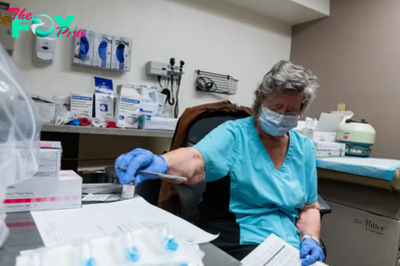Health
Colorado leads on medical debt protections, even as health care costs remain “out of control”
Lindsey Vance carried medical debt for nearly half her life.
The 41-year-old Denver resident said her debt began stacking up when she was around 19, when she stopped being covered under her parents’ health insurance and turned to the emergency room for health care related to injuries and illnesses.
“If I made enough money at the time, I would have, of course, paid my bills. I couldn’t afford to go see a doctor, and I certainly couldn’t afford to pay the medical bills when they came,” she said. “So I was in a situation for a long time where I was accruing medical debt but not able to pay it off.”
That debt prevented her from having a car, apartment or credit card in her name for most of her adult life, because it appeared on her credit report and worked against her loan application. The family’s cars are in her husband’s name, and her in-laws cosigned on their Colorado apartment.
She is now both insured and in a better situation financially and was able to get her very first credit card a few months ago.
“But my credit has been absolutely terrible my entire adult life because of the medical debt,” she said.
A recently-enacted law aims to help the estimated 700,000 Coloradans like Vance with medical debt by removing it from consumer credit reports. The law is one of several policies Colorado lawmakers have advanced in recent years to lessen the burden of medical debt. Another recent law caps the allowable interest on the debt to 3% and aims to ensure transparency with consumers. In conjunction with the state’s Hospital Discounted Care program, created in 2021 for uninsured and low-income patients, and other debt-related laws, experts say that Colorado is a leader among states when it comes to medical debt protection policies.

“Colorado is definitely at the forefront, especially with the recently enacted legislation,” said Maanasa Kona, an assistant research professor at Georgetown University’s Center on Health Insurance Reforms and author of a Commonwealth Fund report comparing states’ medical debt policies.
“It is some of the more ambitious actions we’ve seen states take,” she said.
Nationwide, about 100 million people have some form of health care debt, according to research by KFF Health News. The crisis is forcing millions of Americans to ration medical care, take on extra work and cut back on food, clothing and other essentials. Around Denver, medical debt is also exacerbating the city’s problem with housing affordability.
At the same time, a growing number of states are exploring ways to help patients, including Arizona, Oregon, New Mexico, New York and Maryland.
Debt removed, credit improves
The trailblazing credit reporting law, House Bill 1126, was one of two medical debt bills passed during Colorado’s 2023 legislative session. It requires credit reporting agencies to remove the debt from consumer reports, limiting who can see it.
Julia Char Gilbert, a former policy advocate at the Colorado Center on Law and Policy who worked on the legislation, said the law helps mitigate harm for the estimated 700,000 Coloradans who have medical debt in collections — debt accrued from accidents or illnesses that launch patients into a pricey Health care system.
About 11% of Coloradans have medical debt in collections with a median of $693, according to data from the Urban Institute. Nationally, 13% of people have medical debt in collections.
“If you went to apply for a new apartment, apply for certain jobs, apply for a loan or mortgage — even setting up a cell phone plan or setting up utilities at your new apartment — all of those are junctures that are really important for living an economically stable and thriving life, and situations where medical debt showing up on your credit report could mean the difference between housing stability and housing instability,” she said. “These are ways that people are being harmed in a cascading way throughout their lives.”

“Diagnosis: Debt Colorado” is a reporting partnership among KFF Health News, the Colorado News Collaborative, The Colorado Sun, 9News, Colorado Newsline and The Sentinel exploring the scale, impact, and causes of medical debt in Colorado. The ongoing series branches from KFF Health News’s award-winning reporting on medical debt in the United States.
The credit report protection expires in July 2028. There is an exception if a person is trying to get a loan for more than the Federal Housing Finance Agency’s conforming loan limit for a one-unit property, which is $766,550 this year.
An Urban Institute analysis found that many consumers saw their credit score improve as medical debt gets removed. Those researchers found that after the credit-scoring company Vantage stopped including medical debt in collections in its score calculations, its average score for affected consumers increased from 585 to 615 points.
Colorado was the first state to enact such a law, followed by New York. The federal Consumer Financial Protection Bureau is developing new regulations that would bar credit reporting for medical debt nationally.
Removing medical debt from credit scores does not mean that patients no longer owe the money, and Coloradans with unpaid bills can still be targeted in other ways, including collection lawsuits by hospitals and other medical providers.
-

 Health1d ago
Health1d agoTeens Are Stuck on Their Screens. Here’s How to Protect Them
-

 Health1d ago
Health1d agoHow Pulmonary Rehab Can Help Improve Asthma Symptoms
-

 Health1d ago
Health1d ago10 Things to Say When Someone Asks Why You’re Still Single
-

 Health2d ago
Health2d agoThe Surprising Benefits of Talking Out Loud to Yourself
-

 Health2d ago
Health2d agoDoctor’s bills often come with sticker shock for patients − but health insurance could be reinvented to provide costs upfront
-

 Health3d ago
Health3d agoWhat an HPV Diagnosis Really Means
-

 Health3d ago
Health3d agoThere’s an E. Coli Outbreak in Organic Carrots
-

 Health4d ago
Health4d agoCOVID-19’s Surprising Effect on Cancer



























